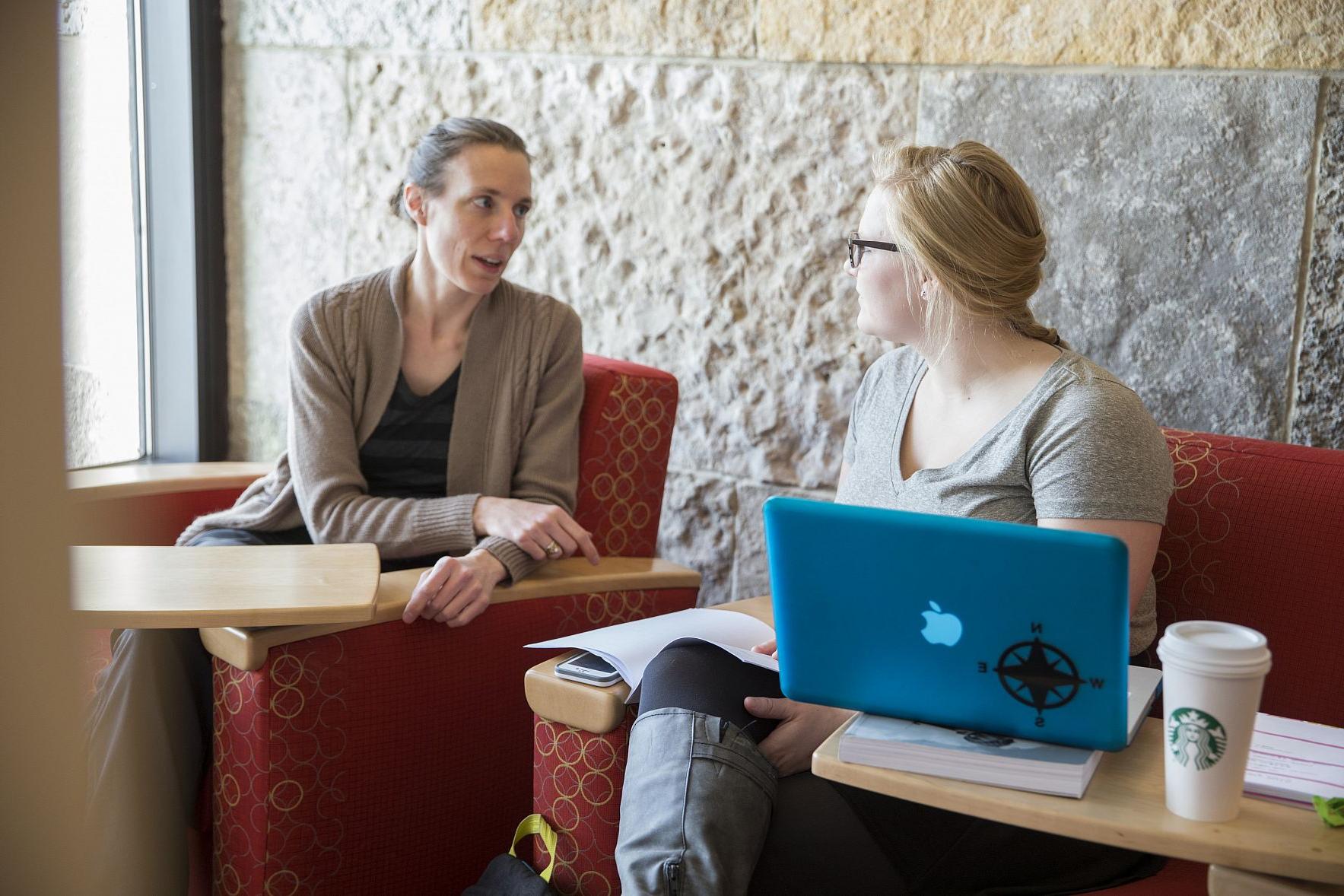For Current Students

Welcome, Carthage students!
Learning Accessibility Services works with students to determine appropriate accommodations in the academic setting here at Carthage. If you would like to discuss accommodations, please contact us so we can set up a time to meet in person or talk on the phone about the accommodation process. Students with documented disabilities are entitled to accommodations that ensure equal access to Carthage learning experiences. Students are responsible for contacting Learning Accessibility Services and providing current documentation.
Please see below for specific information on important topics, and don’t hesitate to call or write with questions or concerns: Warren Wolchuk, Director of Learning Accessibility Services, Hedberg Library 214, 262-551-5802, wwolchuk@xyschool.net.
SECURING ACADEMIC ACCOMMODATIONS AT CARTHAGE
- Contact Learning Accessibility Services (LAS) to let the staff know you intend to request accommodations. Please do so as soon as you have decided to attend Carthage.
- Provide LAS with current documentation of a disability.
- Meet with an LAS staff member to discuss specific accommodations for classes and create an accommodations sheet to share with your instructors.
- Deliver accommodations forms to each instructor and discuss how accommodations will work for each class.
- Follow up with LAS regarding any concerns about accommodations.
SUGGESTIONS FOR STUDENTS
- Think about how your disability might affect your learning.
- Contact LAS prior to admission, or immediately following the diagnosis of a disability.
- Provide written documentation to verify your disability and to identify appropriate accommodations.
- Provide reasonable notice for accommodation requests.
- Identify and observe all deadlines (e.g. admissions, housing, financial aid, advising).
Documentation is confidential information from an appropriately qualified health or other service professional who is knowledgeable about the student’s condition. This might be a therapist, physician, rehabilitation counselor, school psychologist, or audiologist. Documentation varies in length and format but should clearly state the nature of the disability and how the disability impacts the student. The more recent the documentation is, the more helpful it is likely to be when considering accommodations. Examples of documentation include:
- Psychoeducational evaluation
- Neuropsychological assessment
- Individualized Educational Plan (IEP)
- 504 Plan
- Vocational assessment
- Letter from health or other service professional
- Audio/electronic text materials
- Academic accommodations
- Note-taking support
- Test-taking accommodations
- Voice dictation software
- If you are having trouble with specific course content, web content, technology, or other access, please contact Learning Accessibility Services so we can work with you to remedy the situation.
Learning Accessibility Services provides accessible versions of textbooks for students whose disabilities interfere with their ability to read traditional print books. Students who require accessible textbooks should contact Warren Wolchuk (wwolchuk@xyschool.net) and provide as much advance notice as possible. Students may need to provide receipts for hard copies of their books in order to obtain certain electronic textbooks.
Learning Accessibility Services provides test-taking accommodations to students with documented disabilities at the LAS Testing Center in Hedberg Library, room 216.
Accommodations frequently include extended time and a separate room for testing. Students are welcome to take both tests and quizzes in the LAS Testing Center. The Center is staffed by graduate students and is open each weekday. It is the student’s responsibility to schedule at the LAS Testing Center and to remind his/her/their professors to email the test to the Testing Center at testingcenter@xyschool.net.
Visit the Accessibility Services and Resources at Hedberg Library webpage for information on the following:
- Hedberg Library Resources (audiobooks, ebooks)
- Kenosha Public Library Resources
- Online Textbooks
- Technology and Software.
- Assistive Technology Station at Hedberg
Contact the Hedberg Library Information Desk for help: help@xyschool.net, 262-551-5950, or visit the desk in person.
- Academic Coaching and Learning Strategies: Academic coaches offer assistance with academic skills like time management and study strategies.
- Center for Student Success: The Center for Student Success includes the First Year Advisors, who assist students with course schedules, class registration, tutoring, choosing a major, fulfilling graduation requirements, and more.
- Equity and Inclusion: The Carthage academic community is committed to fostering integrity, civility, and justice. Aiming to learn from each other, we reject all forms of prejudice and discrimination toward underrepresented groups.
- Health and Counseling Center: The Health and Counseling Center provides free individual and group counseling on emotional health issues, including self-esteem, depression, and anxiety. Information on a variety of mental health topics is also available.
- LAS Testing Center: Learning Accessibility Services provides test-taking accommodations to a student with documented disabilities, often in the form of extended time and a separate room for testing.
- Library, Research, and Technology: Research assistance, borrowing library items and computing equipment, assistive software, and technology.
- Peer Tutoring: Individual or small group peer tutoring sessions are free and available for almost every course at Carthage. From Spanish to art history to organic chemistry, and an experienced peer is ready to work with you.
- Writing Center: The Brainard Writing Center is a free resource available to all members of the Carthage community. Whether you need help choosing a topic, formulating a thesis statement, organizing your thoughts, or polishing your final draft, the Writing Center is here to help.
- Learning Accessibility Services: Warren Wolchuk, wwolchuk@xyschool.net, or 262-551-5802, Hedberg Library room 214.
- Health and Counseling Center: health@xyschool.net, 262-551-5710, TARC 2240.
- Library Information Desk: help@xyschool.net, 262-551-5950, or visit the desk in person in the upper level of Hedberg Library.
- LAS Testing Center: testingcenter@xyschool.net, Hedberg Library room 216.
- Tutoring and Supplemental Instruction: tutoring@carthage.edu, Hedberg Library room 215.
- Writing Center: writingcenter@xyschool.net, 262-551-5755, Hedberg Library room 213.
